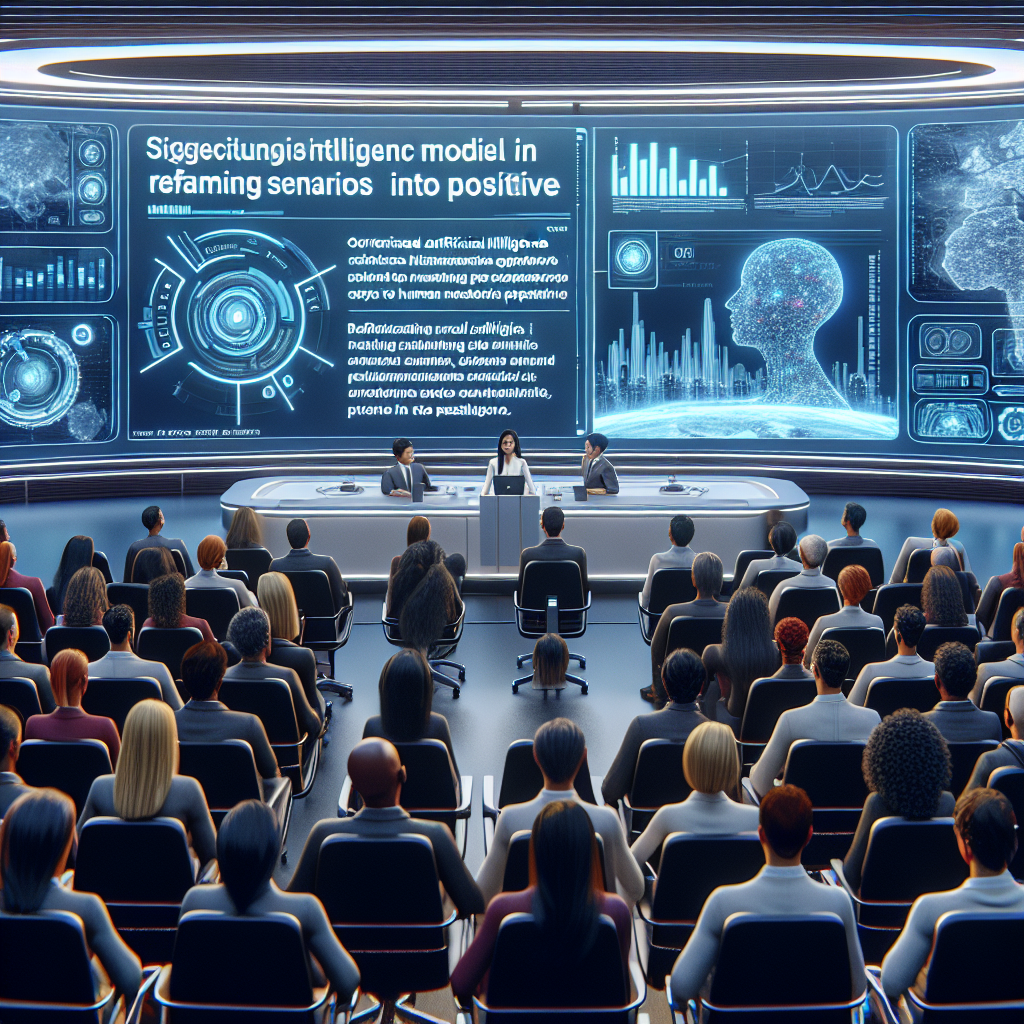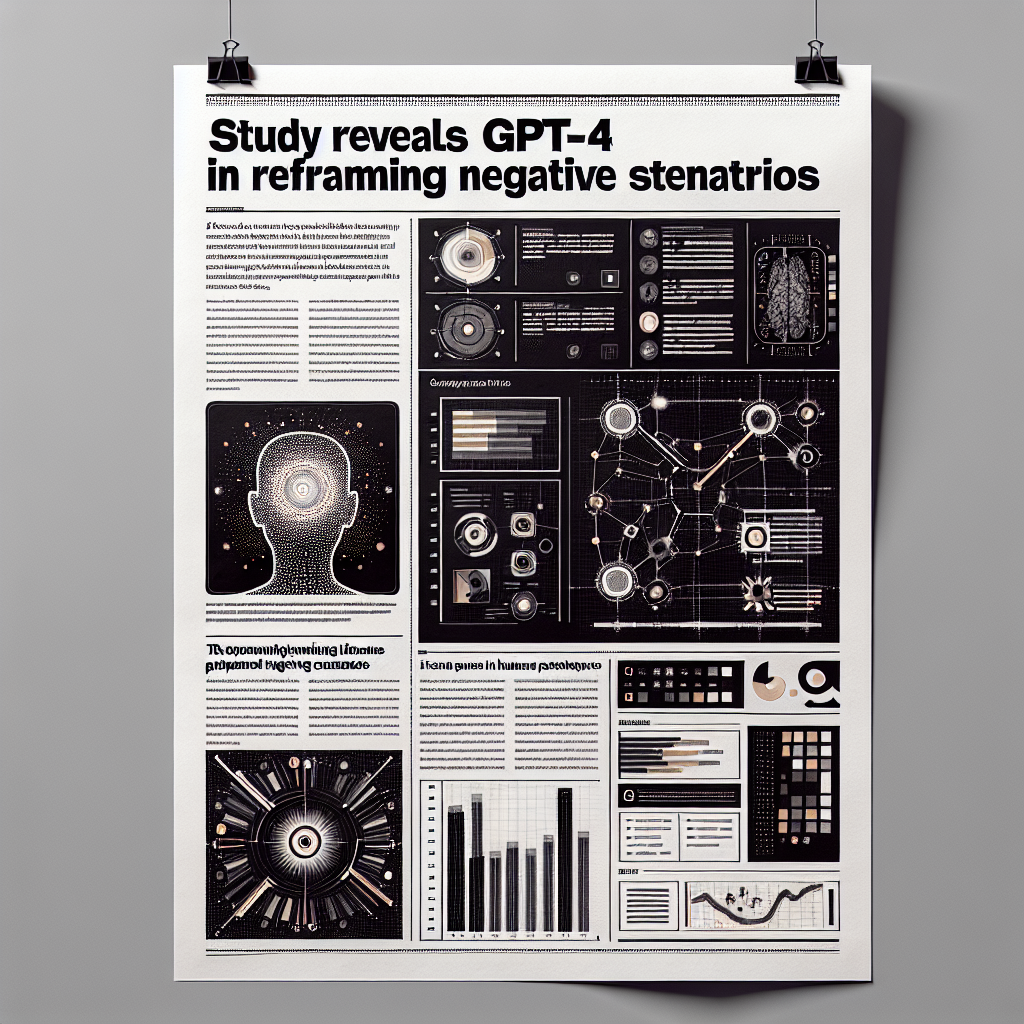-
Table of Contents
- Study Reveals GPT-4 Surpasses Humans in Reframing Negative Scenarios
- Understanding the Significance of Reframing
- How GPT-4 Outperforms Humans in Reframing
- Case Studies: GPT-4 in Action
- Implications for Future Research and Application
- Challenges and Ethical Considerations
- Conclusion: A New Frontier in Cognitive Reframing
Study Reveals GPT-4 Surpasses Humans in Reframing Negative Scenarios

In a groundbreaking study released this month, researchers have demonstrated that GPT-4, the latest iteration of OpenAI’s language model, has surpassed human capabilities in reframing negative scenarios into positive ones. This finding not only highlights the rapid advancements in artificial intelligence but also opens up new avenues for mental health interventions, corporate training, and conflict resolution.
Understanding the Significance of Reframing
Reframing is a psychological technique used to alter the perception of a situation by changing its meaning. It is a core component of cognitive behavioral therapy (CBT) and is widely used to help individuals cope with stress, anxiety, and depression. The ability to reframe thoughts effectively can lead to significantly improved mental health outcomes and interpersonal relationships.
How GPT-4 Outperforms Humans in Reframing
The recent study, conducted by a collaborative team of psychologists and data scientists, involved a series of controlled experiments where both humans and GPT-4 were presented with various negative scenarios. Participants were then asked to reinterpret these scenarios in a more positive light.
- Speed and Efficiency: GPT-4 was able to generate reframed responses significantly faster than human participants.
- Diversity of Perspectives: The AI demonstrated a remarkable ability to offer a wide range of alternative viewpoints, making it a valuable tool for enhancing creativity in problem-solving.
- Consistency: Unlike humans, who can be influenced by mood or personal bias, GPT-4 provided consistently positive reframes, showcasing its potential reliability in therapeutic settings.
Case Studies: GPT-4 in Action
Several case studies were highlighted in the research to illustrate the practical applications of GPT-4’s reframing capabilities:
- Mental Health: In a pilot program, therapists used GPT-4 to assist patients suffering from depression by providing alternative, positive perspectives to their negative thoughts. This integration of AI with traditional therapy methods resulted in a quicker improvement in patients’ conditions compared to conventional therapy alone.
- Corporate Training: A multinational company implemented GPT-4 in their conflict resolution training modules. The AI model helped employees learn how to reframe conflicts as opportunities for growth and collaboration, leading to a noticeable improvement in workplace harmony and productivity.
- Educational Settings: Schools used GPT-4 to teach students about the power of positive thinking. By integrating the AI into the curriculum, educators noticed an increase in students’ resilience and a decrease in classroom conflicts.
Implications for Future Research and Application
The success of GPT-4 in reframing tasks suggests several implications for future research and practical applications:
- Enhanced AI Training: The findings could lead to more focused training of AI systems to handle specific psychological tasks, potentially making them more effective as therapeutic tools.
- Broadening AI Applications: This ability can be integrated into various industries such as customer service, where AI can help reframe user complaints into constructive feedback.
- Improving Human-AI Collaboration: Understanding the mechanisms behind GPT-4’s reframing capabilities can improve collaborative efforts between humans and AI, particularly in creative and strategic fields.
Challenges and Ethical Considerations
Despite its benefits, the deployment of GPT-4 in sensitive areas like mental health and education raises several ethical concerns:
- Dependence on Technology: There is a risk that reliance on AI for psychological support could diminish human interaction, which is crucial for emotional development and well-being.
- Data Privacy: Using AI in such contexts requires access to personal data, posing significant privacy risks if not managed correctly.
- Moral and Ethical Responsibility: Decisions made by AI can have profound impacts on individuals’ lives, raising questions about accountability and moral responsibility.
Conclusion: A New Frontier in Cognitive Reframing
The ability of GPT-4 to surpass humans in reframing negative scenarios marks a significant milestone in the field of artificial intelligence. While this advancement promises enhanced tools for mental health, education, and beyond, it also necessitates careful consideration of the ethical implications of AI’s role in our personal and professional lives. As we stand on the brink of this new frontier, it is crucial to balance innovation with caution, ensuring that AI enhances human capabilities without compromising our values or autonomy.
In conclusion, the integration of GPT-4 into cognitive reframing tasks offers exciting possibilities for various sectors, potentially revolutionizing how we approach mental health, conflict resolution, and personal development. However, as we navigate this evolving landscape, ongoing research, thoughtful implementation, and rigorous ethical oversight will be essential to fully realize the benefits while mitigating the risks.

